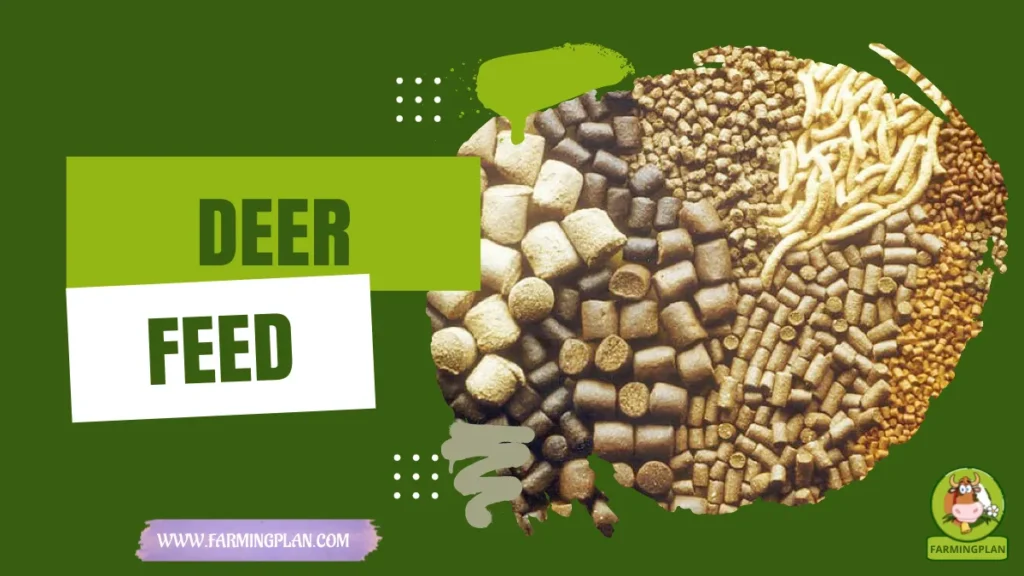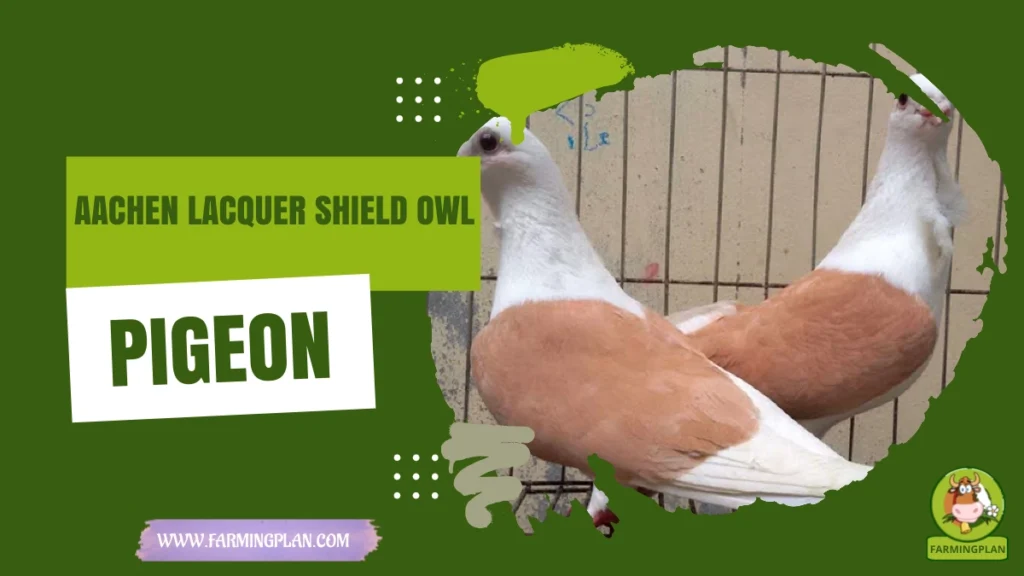The Africanis Dog is more than just a pet it’s a living piece of Southern Africa’s history. Bred by nature through generations of natural selection, this distinct breed has lived alongside human settlements for centuries. From the indigenous people of South Africa to today’s families with children, the Africanis has always adapted with intelligence, loyalty, and energy. Whether you’re a dog lover, a farmer, or simply curious about Africa’s unique landrace dog types, you’ll find the Africanis Dog to be an energetic breed with a story that’s deeply rooted in human history. Let’s explore what makes this fascinating breed so special, from its ancient origins to life in the fast-changing South Africa of today.
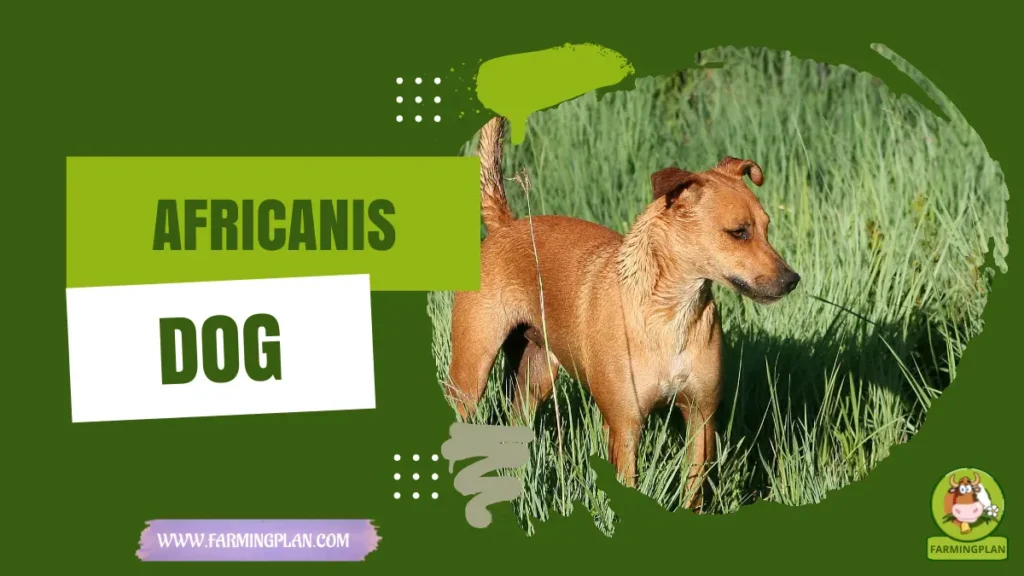
History & Origin of the Africanis Dog
The Africanis Dog has walked alongside humans across the African continent for centuries. Its roots trace back to the 6th century, when Iron-using people and Bantu-speaking communities began migrating from North Africa to what we now know as Southern Africa. These early settlers brought dogs with them, not as luxury pets but as practical companions. Over time, these dogs adapted to different climates, diseases, and predators through natural selection, not human-designed breeding.
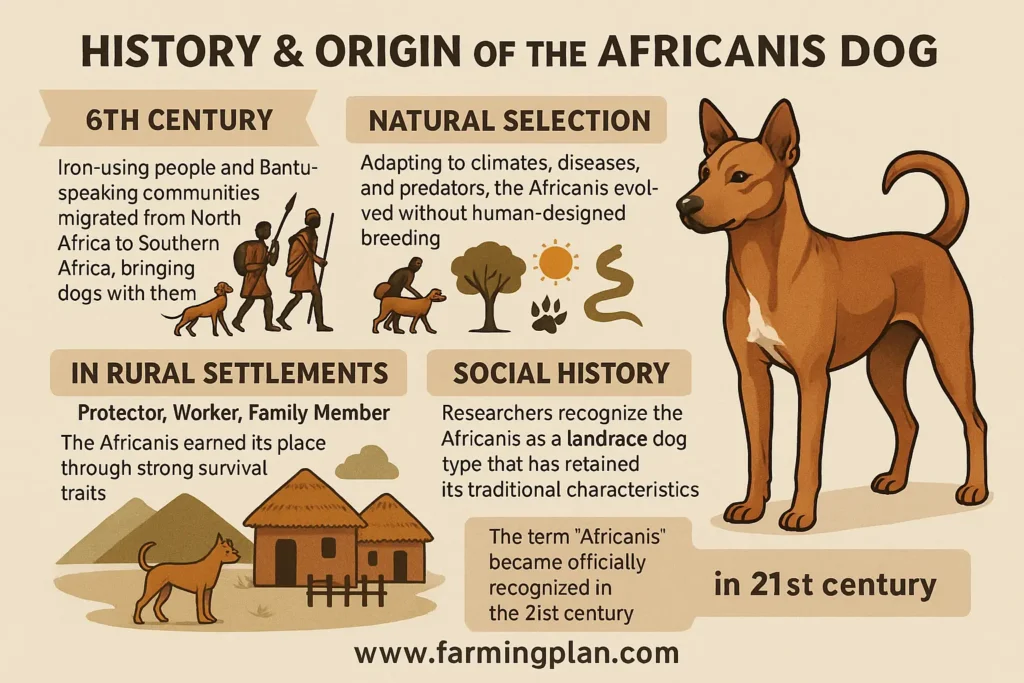
In rural areas, especially around rural settlements, the Africanis earned its place as a protector, a working partner, and a beloved member of the family. Because they were never bred for looks or trends, they evolved as a coherent breed with strong survival traits, not superficial ones.
Many historians and researchers, including those connected to Museum Africa, recognize the Africanis Dog as part of the social history of the continent. It’s one of the few landrace dog types that still exists largely unchanged by modern breeding practices. In fact, the term “Africanis” became officially recognized only in the 21st century, despite the breed’s presence in South Africa for thousands of years.
This dog’s development was shaped by close association with people, not forced classification. That’s why the Africanis isn’t just a breed it’s a symbol of adaptation, community, and shared history across generations.
Characteristics of the Africanis Dog
The Africanis Dog has a strong, lean body built by nature, not by design. Shaped through selection over generations, it’s a naturally fit and distinct breed that stands out for its simplicity and strength.
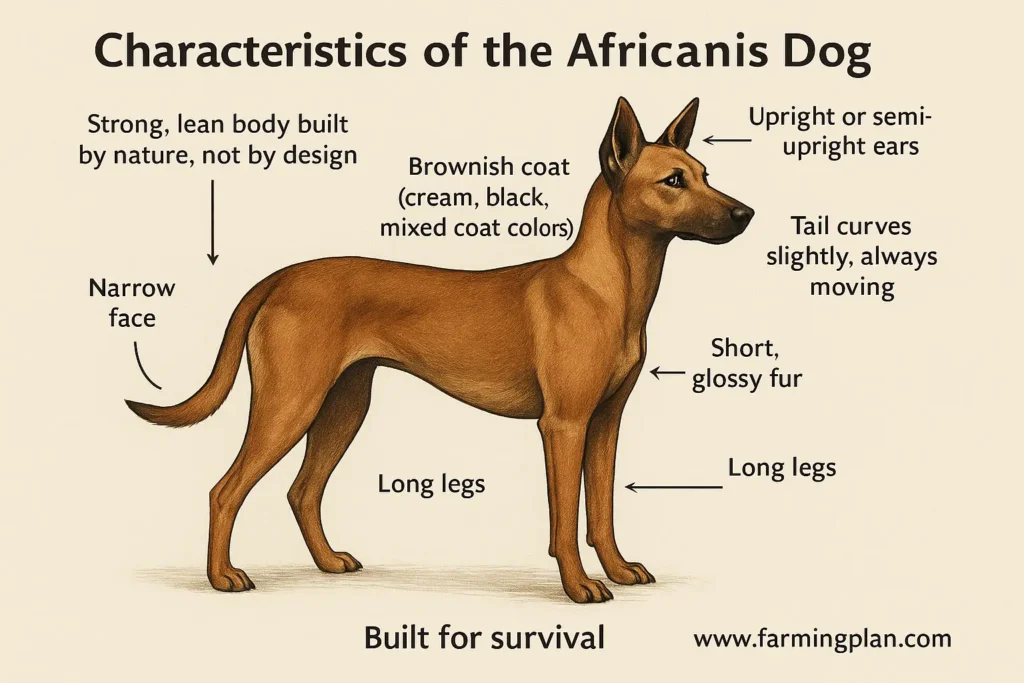
Most Africanis Dogs have brownish coats, but you’ll also see cream, black, and even mixed coat colors. Their short fur is easy to care for and usually forms a shiny coat when they eat the right food and live in a healthy environment. Keeping the coat healthy is simple with regular brushing and a good diet.
This landrace southern breed has upright or semi-upright ears, long legs, and a narrow face. Their tails curve slightly and are always moving, showing their alert and active nature. Unlike many other breeds of dogs, Africanis Dogs don’t have exaggerated features. Everything about their body is balanced, helping them move fast and stay strong.
They were built for survival, so they can handle hot weather, rough ground, and long walks without trouble. This makes them perfect for life in rural settlements or active homes. Whether as a guard dog or loyal companion, the Africanis shows you that beauty can come from purpose not from breeding for show.
Temperament and Personality Traits
The Africanis Dog is an intelligent breed known for its loyal, calm, and confident personality. Raised near people for centuries, this dog has a strong association with people and fits easily into family life especially in families with children.
It’s an energetic breed that loves to run, explore, and stay active. Because of their sharp minds and quick reflexes, Africanis Dogs do very well with agility training and obedience training. They respond best when the training is fun, consistent, and based on rewards.
Their behavior is shaped by their surroundings. In rural areas, they tend to be more independent but still alert to danger. In homes, they form deep bonds with their owners and become gentle protectors.
With proper training and daily exercise, they grow into well-behaved companions. They’re not aggressive without reason, but they will stand their ground if they sense a threat. Whether in the countryside or city, the Africanis brings balance strong but gentle, independent yet loyal. They don’t just live with people they thrive with them.
Read More : Cocker Spaniel: Perfect Family Companion Dog
Food & Diet for a Healthy Africanis Dog
Feeding an Africanis Dog the right food is key to keeping it strong, active, and healthy. Since this fascinating breed developed naturally in South Africa, it does well on simple, balanced meals. You don’t need expensive food just the right nutrients.
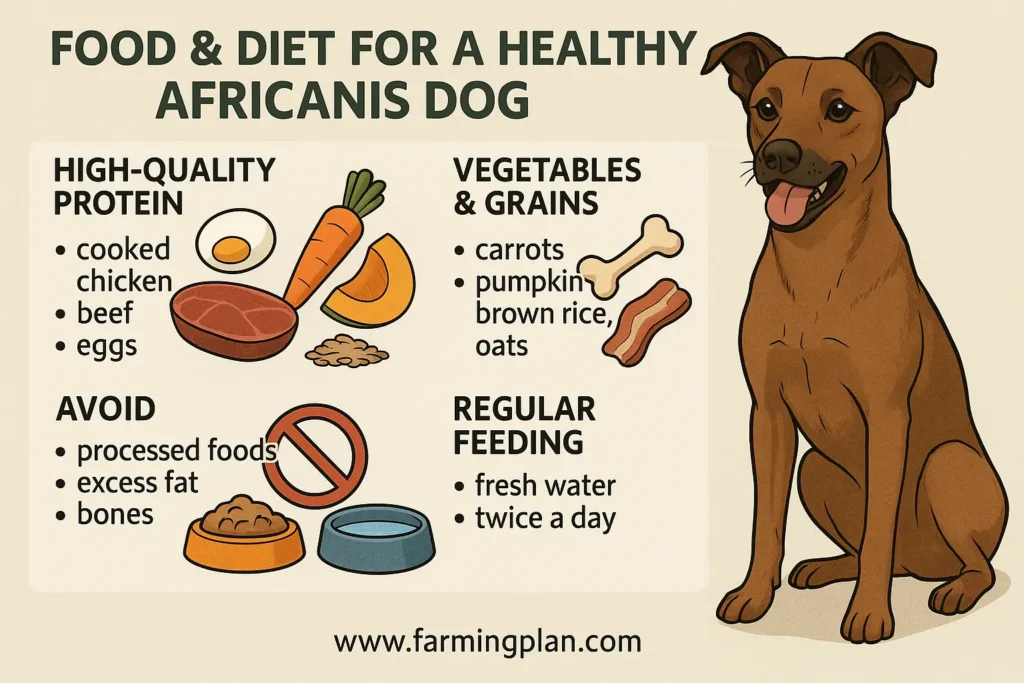
The Africanis has a short coat, so diet directly affects whether it has a shiny coat or a dry one. Make sure to feed high-quality protein like cooked chicken, beef, or eggs. Add cooked vegetables like carrots and pumpkin for fiber and skin health. Brown rice or oats can be used for energy.
Avoid processed foods, too much fat, or bones that can splinter. These can harm the dog’s digestion or teeth. In today’s fast-changing South Africa, many dog owners mix traditional diets with modern kibble. That works well if the kibble is grain-free and rich in protein.
Always give fresh water and keep to a regular feeding schedule twice a day works best. Puppies may need three smaller meals a day.
This energetic breed burns a lot of energy, so underfeeding leads to weight loss. But overfeeding causes bloating or joint problems. Watch their weight and adjust food as needed.
A healthy Africanis is easy to spot alert eyes, a lean frame, and a coat that shines. Food isn’t just fuel; it’s the first step in lifelong health.
Uses & Purposes of the Africanis Dog
The Africanis Dog is more than just a companion it’s a hardworking, loyal helper with many uses in daily life. For centuries, this distinct breed has served in rural settlements across Southern Africa, proving its value beyond being a pet. One of its main roles is that of a guard dog. With sharp senses and a natural instinct to protect, the Africanis alerts families to danger without needing special training. Its loyalty and watchful nature make it perfect for homes, farms, and livestock areas.
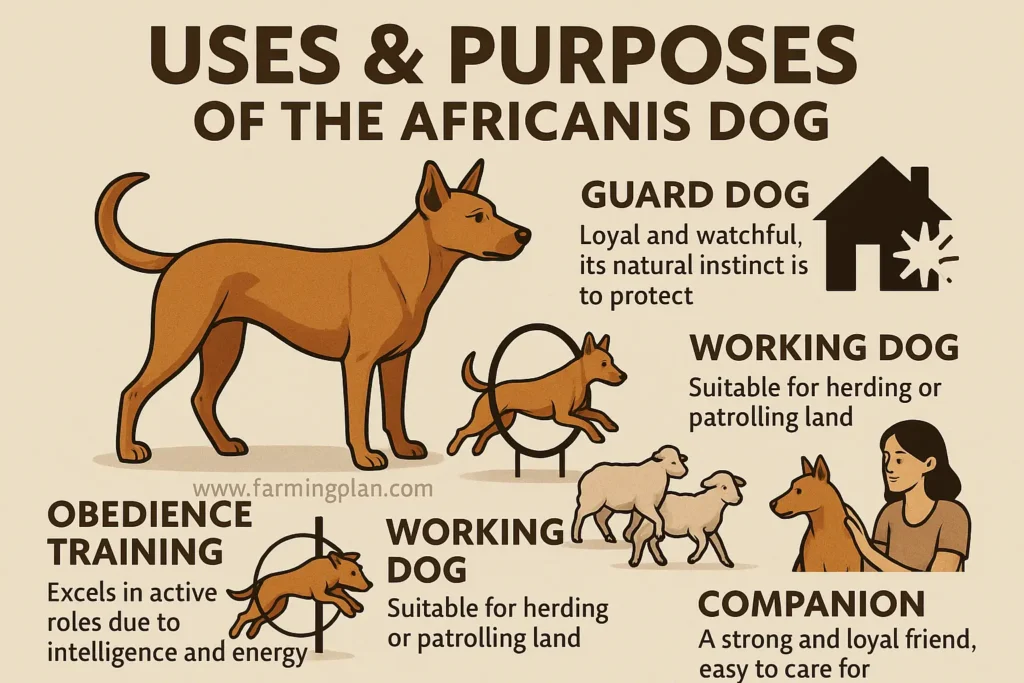
Thanks to its high energy and sharp thinking, the Africanis also excels in obedience training and agility training. This makes the dog suitable for active owners or even small-scale working roles, such as herding or patrolling land. Though it’s not often seen in dog shows, the Africanis deserves a place in any breed spotlight. It may not follow formal breed classifications, but it holds a strong place in the heart of South African culture and tradition.
Today, many people in both rural and urban areas choose the Africanis for its easy care, strength, and strong bond with humans. Whether used for guarding, working, or simply being a loyal friend, this coherent breed always brings purpose to its presence.
Read More : Bernese Mountain Dog: Powerful Perfect Family Pets
Special Features That Make the Africanis Dog Unique
The Africanis Dog stands apart as a fascinating breed with rare, natural traits developed through centuries of natural selection. Unlike modern breeds shaped in kennels, the Africanis evolved alongside people in Southern Africa, adapting to life, climate, and survival through real-world challenges. One of its most unique strengths is its intelligence. The Africanis learns quickly, solves problems, and reacts fast in both rural and urban settings. This makes the dog ideal for situations that need both brains and instinct like protecting a home or guiding livestock.
Another special trait is its natural health and resilience. Shaped by the African environment, the Africanis developed a strong immune system. It resists many diseases that affect other breeds of dogs. That’s part of what makes it a true landrace dog type a breed formed by the land, not people. Physically, the dog is lean, fast, and powerful. Its smooth, short coat stays clean and healthy with little grooming. The dog’s agility and stamina make it perfect for long runs, hikes, or outdoor work.
Its deep association with people, especially in traditional communities, adds to its value. This dog didn’t just live beside humans it helped shape the social history of African families. Simply put, the Africanis is not just a survivor. It’s a symbol of nature, tradition, and loyalty.
Read More : Collie Dog: Expert Tips For Happy and Healthy Dogs
Health Issues & Prevention Tips for the Africanis Dog
The Africanis Dog is known for its strong health, thanks to centuries of natural selection and life in tough environments. But like all dogs, it still needs care to stay healthy and active. Because this landrace southern breed wasn’t shaped by forced breeding, it has fewer genetic problems than many modern dogs. Still, some common issues can affect it especially if basic care is ignored.
Watch out for ticks, fleas, and worms, especially in warm climates or rural areas. These can cause skin infections or internal problems if not treated. Use vet-approved treatments every few months to keep these pests away.
Skin health is another area to monitor. While their shiny coat is low-maintenance, poor diet or allergies can lead to dry spots or irritation. Feed a healthy diet rich in protein and check their coat health often. Because the Africanis is an energetic breed, it needs regular movement. Without enough exercise, joint stiffness or weight gain can occur. Take your dog on daily walks or runs to avoid these issues.
Routine vaccinations, clean water, and annual vet check-ups are also key. They prevent serious diseases and help catch small problems before they grow. Good health starts at home. With proper care, the Africanis can live a long, happy life and stay as strong and loyal as the land it came from.
“An Africanis Dog Is More Than A Pet, It’s A Loyal Companion Shaped By Centuries Of History And Nature.”
Step-by-Step Care Guide for Raising an Africanis Dog
Raising an Africanis Dog is a rewarding experience that requires attention to training, health, and daily care. This intelligent breed thrives in homes where it’s treated as part of the family, and with the right care, it will be a loyal and energetic companion for years to come.
Step 1: Prepare Your Home for an Africanis Dog
Before bringing an Africanis into your home, ensure you have a safe, secure space. These dogs are highly energetic, so a fenced yard or enclosed area is ideal. If you live in an apartment, make sure there’s ample room for daily exercise.
Step 2: Early Training and Socialization
Start training your Africanis early. This breed is intelligent and responds well to obedience training. Use reward-based training methods to establish a positive relationship from the beginning. Introduce your dog to different environments, people, and pets to encourage good social behavior.
Step 3: Provide a Balanced Diet
Feed your Africanis a diet that includes high-quality protein, healthy fats, and fiber-rich vegetables. Regular meals of chicken, beef, and rice are perfect, but remember to avoid processed food. Always have fresh water available.
Step 4: Daily Exercise and Play
The Africanis is an energetic breed that needs daily physical activity to stay healthy. Take your dog on walks, runs, or hikes. They also enjoy interactive play, such as fetch or agility training. Keep sessions short but fun to ensure your dog stays engaged.
Step 5: Grooming and Coat Care
Despite its low-maintenance coat, the Africanis benefits from regular grooming. Brush their coat once a week to remove loose hairs and keep it shiny. Check for any skin issues or parasites, and keep your dog’s nails trimmed.
Step 6: Regular Health Checkups
Visit the vet at least once a year for routine check-ups, vaccinations, and flea/tick prevention. While the Africanis is a healthy breed, regular vet visits will help detect any potential issues early. Keep up with vaccinations and parasite control to ensure your dog’s health is maintained.
Step 7: Foster a Strong Bond
The Africanis thrives on human interaction. Spend quality time with your dog, offering affection, training, and rewards. The stronger your bond, the more loyal and well-behaved your Africanis will be.
FAQ
What is the Africanis Dog?
The Africanis Dog is an indigenous breed of Southern Africa, developed through natural selection over centuries. It’s a distinct breed known for its agility, intelligence, and strong bond with humans.
What are the common health issues in Africanis Dogs?
While generally healthy, Africanis Dogs can experience conditions like entropion, ectropion, and hip dysplasia. Regular veterinary check-ups and preventive care are essential to maintain their health .
How much exercise does an Africanis Dog need?
Africanis Dogs are energetic breeds requiring at least 1 to 1.5 hours of vigorous exercise daily. Activities like running, hiking, and agility training help keep them fit and mentally stimulated .
Are Africanis Dogs good with children?
Yes, Africanis Dogs are known for their friendly and patient nature, making them excellent companions for families with children. Their loyalty and protective instincts add to their suitability as family pets .
How should I groom an Africanis Dog?
The Africanis has a short, smooth coat that requires minimal grooming. Weekly brushing with a gentle brush, occasional bathing, and regular ear, nail, and dental care are sufficient to maintain their hygiene and coat health .
Conclusion
The Africanis Dog is a remarkable breed, deeply rooted in the history of Southern Africa. Evolving through natural selection, it embodies resilience, intelligence, and a profound connection with humans. Its distinct breed characteristics—agility, loyalty, and adaptability make it an excellent companion for active families. With proper care, including regular exercise, grooming, and health check-ups, the Africanis thrives as a loving and protective member of the family. Embracing this breed means celebrating a living testament to Africa’s rich cultural heritage and the enduring bond between humans and dogs.

